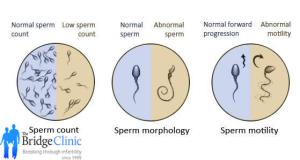
04:56 7th April 2013 | Motile Sperm
Sperm Count Normal Motile Sperms Fallopian Tubes IVF Fertilisation Chromosomal Abnormalities Klinefelters Syndrome Undescended Testes Normal Sperm Production Dilatation Infertility Semen Parameters
The importance of sperm count is explained in the concept of the total normal motile count. This is the total amount of sperms that are normal and also motile that is available to
fertilise the eggs. There is evidence that following intercourse only about 15% of the total normal motile sperms get to the site of fertilisation of the egg in the fallopian tubes.
We also know from our experience with IVF that we need approximately 200,000 sperms around each egg to assure fertilisation of the egg. A sperm sample with a density of 20million,
motility of 50%(10million) and normal forms of 15% delivers a total normal motile count (TNMC) of 1,5000,000. If only 15% reaches the site of fertilisation then we will expect 225,000
sperms around the egg at the site of fertilisation.
This phenomenon explains the difficulties of achieving fertilisation with low sperm counts as there just is not enough sperm around the eggs to achieve fertilisation.
There are many reasons why a man may have low sperm count.
There are many theories about causes of infertility but the unfortunate fact is that for most men with abnormal semen parameters we are not able to effectively improve the sperm count in a way that will lead to pregnancy.
Search by condition, treatment or keyword and conveniently browse our informative articles
Book an appointment online or search for a clinic close to you.
Book an Appointment